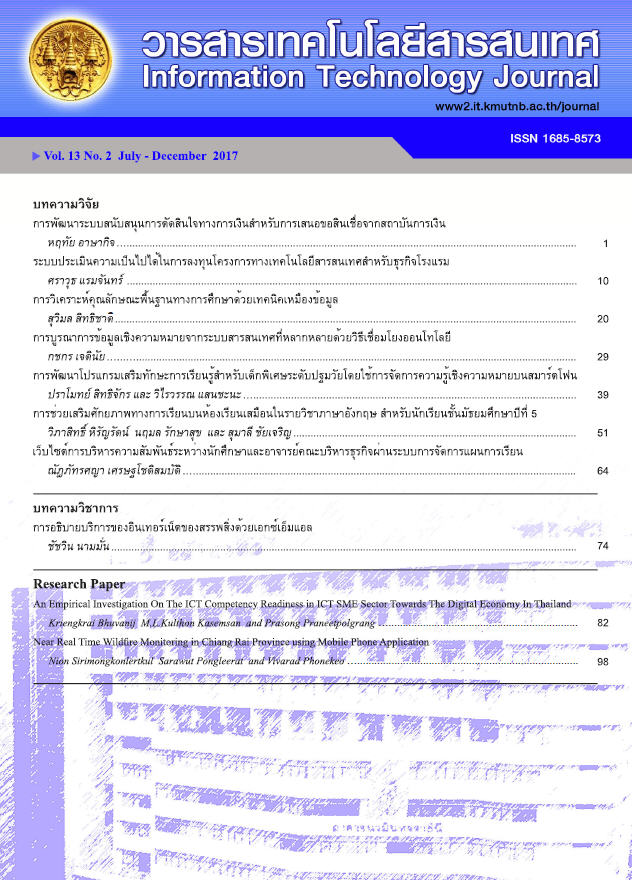การพัฒนาโปรแกรมเสริมทักษะการเรียนรู้สำหรับเด็กพิเศษระดับปฐมวัย โดยใช้การจัดการความรู้เชิงความหมายบนสมาร์ทโฟน
Main Article Content
Abstract
เด็กพิเศษ หรือเด็กที่มีความต้องการพิเศษ ต้องการทางการศึกษาแตกต่างไปจากเด็กปกติทั้งในด้านเนื้อหา วิธีการ และการประเมินผล โดยเฉพาะในกลุ่มเด็กที่มีความบกพร่องทางสติปัญญาและมีปัญหาทางการเรียนรู้ จะต้องใช้เทคนิควิธีการสอนและสื่อประกอบการเรียนรู้ที่นำเสนอเนื้อหาความรู้อย่างเป็นลำดับ สอนซ้ำ และทบทวนบ่อยๆ ทั้งนี้เพื่อให้เด็กเกิดความรู้ เข้าใจ จดจำ นำไปสู่การเกิดความคิดรวบยอดได้ ด้วยเหตุนี้จึงเป็นโจทย์สำคัญในการดำเนินงานวิจัยโดยมีวัตถุประสงค์ 1)เพื่อศึกษาปัญหาด้านการเรียนรู้ของเด็กพิเศษระดับปฐมวัย 2) เพื่อพัฒนาและวัดประสิทธิภาพการทำงานของโปรแกรมเสริมทักษะการเรียนรู้สำหรับเด็กพิเศษระดับปฐมวัยโดยใช้แนวคิดการจัดการความรู้เชิงความหมายบนสมาร์ทโฟน และ 3) เพื่อประเมินพัฒนาการด้านการเรียนรู้ของเด็กพิเศษระดับปฐมวัยก่อนและหลังเรียนด้วยโปรแกรม ซึ่งผลการวิจัยพบว่า เด็กพิเศษส่วนใหญ่ขาดทักษะพื้นฐานทางสติปัญญา การรับรู้ทางภาษา และกล้ามเนื้อมัดเล็ก การพัฒนาโปรแกรมเสริมทักษะการเรียนรู้ ประกอบด้วย 4 ส่วน ได้แก่ 1) ฐานความรู้ออนโทโลยีในการจัดเก็บโครงสร้างเนื้อหาการเรียนรู้ จำนวน 40 โหนด แบ่งออกได้ 5 ระดับชั้น 2) ฐานกฎ SWRL เพื่อการอนุมานความรู้เชิงเหตุผล 3) อัลกอริทึ่มจัดลำดับและแนะนำเนื้อหาการเรียนรู้ และ 4) การปฏิสัมพันธ์กับทัชสกรีนและแสดงผลด้วยเสียง และผลการวัดประสิทธิภาพของโปรแกรม พบว่า การสืบค้นและเชื่อมโยงเนื้อหาการเรียนรู้โดยใช้การจัดการความรู้เชิงความหมายมีความสามารถใกล้เคียงกับมนุษย์ และมีประสิทธิภาพที่ดีกว่าการสืบค้นด้วยระบบจัดการฐานข้อมูล และผลการประเมินพัฒนาการด้านทักษะการเรียนรู้ของเด็กพิเศษ พบว่า คะแนนพัฒนาการหลังเรียนด้วยโปรแกรม สูงกว่าก่อนเรียนอย่างมีนัยสำคัญทางสถิติที่ระดับ .05
Children with special needs seemed to be different from other children in educational needs like content, methods, and evaluation; for this reason, children with special needs, especially children with mental retardation and having learning problems must be provided teaching methods and learning materials with giving sequent presentations and repeated teaching, including reviewing to encourage children to learn, understand, and remember to lead to concept learning; therefore, they seemed to be key issues in research methods. The purposes of the research seemed to (1) investigate the problems in learning of children with special needs, (2) develop and measure performance of the program for promoting learning skills of children with special needs based on semantic knowledge management on a smartphone, and (3) evaluate the development of learning skills of children with special needs both before and after classes by using the program for promoting learning skills of children with special needs. The findings of the research indicated that most children with special needs lacked cognitive skills, language and perception, and fine motor skills. The development of the program for promoting learning skills consisted of 4 parts; (1) 40 nodes of the learning content structure storage comprising 5 levels, (2) Semantic Web Rule Language (SWRL) rules of logical inference, (3) sequence algorithm and learning content suggestions, and (4) the interaction with touch screen and voice. In terms of the performance measurement and evaluation of the program, it can be said that searching and connecting learning content based on semantic knowledge management seemed to have a human-like ability, and to be more effective than query format by database management systems. For the evaluation result of the development of learning skills of children with special needs, it was found that the development after class by using the program for promoting learning skills of children with special needs scored higher than the development before class that was statistically significant at the .05 level.


